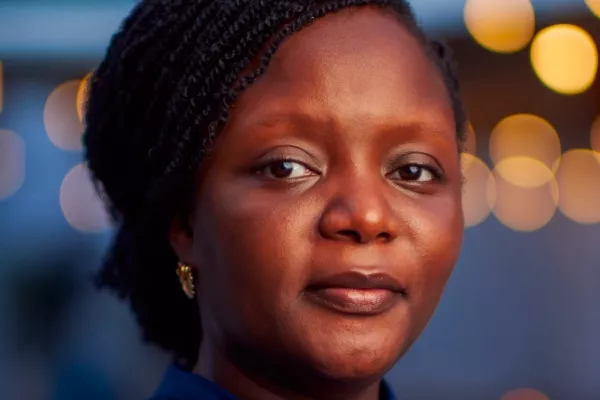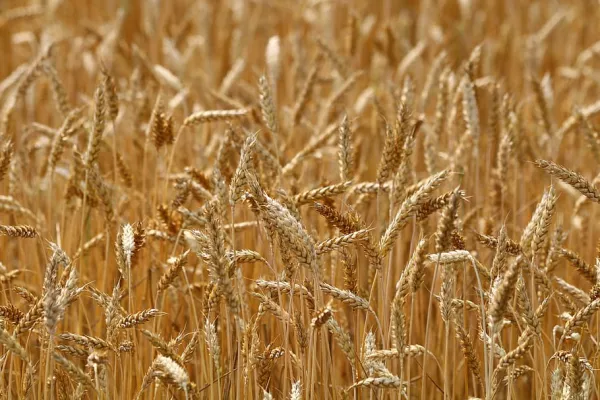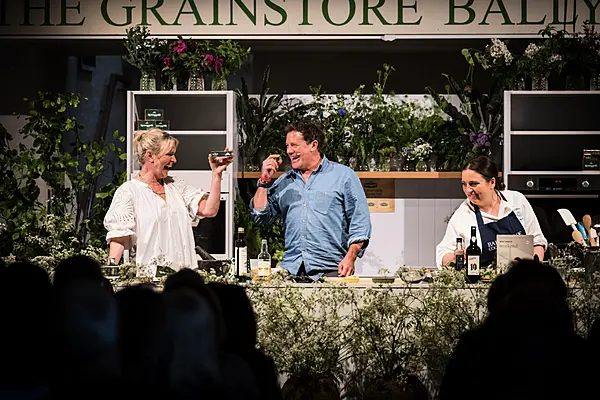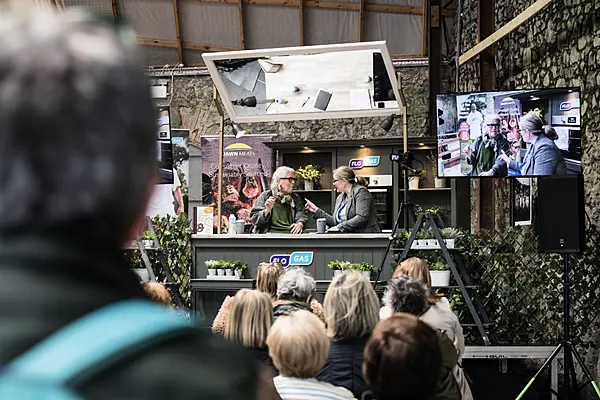Fatmata Binta was born and raised in Freetown, Sierra Leone, to first-generation Sierra Leonean Fulanis of Guinean descent.
Binta describes herself as ‘a modern nomadic chef’.
She was recently awarded the Basque Culinary World Prize for exploring the West African diaspora’s cuisine through her innovative Dine On A Mat experience and setting up the Fulani Kitchen Foundation for women and girls.
This article was originally published in the Autumn 2023 issue of Hospitality Ireland Magazine, in October of 2023.
Tell us about your background and, particularly, what it means to be Fulani.
It means a lot to me. It’s my identity, it’s my background, my culture – it’s where I grew up. It has helped shaped my identity as a chef, and going to culinary school allows me to tell the stories of the community.
Looking at my nomadic kitchen, the goal from the beginning was to stay nomadic. I didn’t want to have a kitchen that you could just walk into, which would limit me when trying to share the message I am trying to spread.
As much as I am a chef, I am a storyteller – it goes both ways. Being able to bring a piece of Africa around the world gives me a bigger platform to share the Fulani culture.
What first drew you to food and cooking?
I grew up in the kitchen, but, back then, I was just washing pots and pans for my grandmother. The tribe I grew up in is very traditional. They are always on the go.
Food is a big part of entertainment for us. Every celebration and ceremony, like a wedding, revolved around food. The generation before me never went to school, so food was always at the centre of building the community.
Even though I lived in the city, I spent vacation periods in the villages, learning the language and the traditions, which revolve around my work. I was expected to learn how to cook all the traditional food.
I am thankful that I got this time to learn about my culture.
When did you want to do this professionally?
In 2010, I moved to Madrid and was an English tutor. I lost my job, so I had to start doing something else. I kind of had an aha moment back in Ghana: I should take two years off to focus on my passion, and if it doesn’t work, two years isn’t long to invest in something you love.
I decided to go to culinary school. I went to a Swiss Alpine school in Nairobi, to learn culinary techniques. I finished off there and started working in hotels.
Then I wanted to start cooking African foods because it didn’t make sense for me to be cooking the foods I didn’t grow up eating. I wanted to understand the food culture, so then I started my journey travelling across Africa, to understand the authentic cuisines and culinary heritage, and document it.
What was your first big role?
I started from the bottom in the kitchen, but I never got to become a sous-chef.
Before I got there, I started travelling Africa, where I documented and learned recipes – real, authentic recipes from the gatekeepers of our food culture – and then I started hosting the Dine On A Mat dinners.What did it mean to you to be awarded the Basque Culinary World Prize?
What did it mean to you to be awarded the Basque Culinary World Prize?
It meant so much, and it wasn’t just about me – it had a great impact on the work I’m doing in my community. It amplified my voice, and also the issues I care about. It was very humbling also, and I am thankful for it – and to be the first African to win it also, this is a great achievement.
Tell us about setting up the Fulani Kitchen Foundation for women and girls.
So, it’s been really interesting. I had started it before Covid. I took time to spend with the women in the communities – sometimes two to three days – and they taught me lots of traditional recipes.
They took time out of their day to help me learn, and it allowed me to collaborate in a more meaningful way with them. I had a lot of time to think during Covid, and during that time, our goals shifted. We wanted to help them find value.
We now have a warehouse, and we are collaborating with [the] FAO – [the] Food and Agriculture Organization of the United Nations – to promote ancient grains and also skills transfer training for the female growers of fonio [an ancient African grain], so they could help grow and place value on the grains, and our foundation seeks to find markets to sell the grain, too.
What does storytelling mean to you, in the context of food?
For me, it’s so important to talk about things I care about and to promote ingredients that I care about. When my guests come in, I use this opportunity to tell stories and to highlight underutilised grains in Africa, and to promote the African gastronomy. Without storytelling, I wouldn’t be able to do that in a fun and meaningful way.
Have you seen a change in what the public expects from food in the last five or so years?
A lot of change and conversations have been happening already about sustainability, and trends are helping this.
People can use ingredients in their ways and how they want to use them. There are a lot of bloggers now – foodies andfood lovers. The food culture hasexpanded in the last few years. We canuse that and get people more interested in our food and culture around the world.
What does it mean for you to take part in Food On The Edge here in Ireland?
It means a lot. I am so looking forward to it. It allows me to bring a piece of Africa to Ireland and tell the African story. It contributes to what we all care about, and to connect with other chefs who are doing the same thing.
This is a movement, and bringing people together that care about the same cause – this is how we can change the world.
What makes a great restaurant?
Flavours are one thing I want from a restaurant. I always try to eat local. I find fine dining a bit hectic.
I would prefer not to sit down for 15 courses – I find it a bit tedious. I want to go to restaurants that have souls in them.
What are the changing trends in hospitality?
I am seeing a lot of fusion foods – I do think it’s a good thing – and sometimes, [with] my experience here in Africa, fusion helps you to promote a dish on a global level that’s not known to a certain palate.
Also, sustainability is a huge trend, and I think it’s being a little bit overused and moving away from what it means. I think we need more responsibility than sustainability.
It’s not easy, though, and restaurants are trying their best to be more sustainable. We need to reflect on what food and dining truly mean for our well-being and our planet.
What are the major challenges at the moment?
Working in the field, I am finding that it’s hard to get people to understand value.
The communities I work in have sometimes had bad experiences in the past with other initiatives, so when you go in, they aren’t thinking long term – they are thinking short term. They are focusing on what they can get right now, rather than value in the long term. They want results now. They just want the grain to be bought – buy-my-grain-and- go attitude – but the farmers need to understand the value and be the custodians of their hard work and their labour.
They should be able to judge for themselves. This is what keeps me awake at night.
What are the main opportunities?
There are opportunities – FAO – to join forces. I have hope because they are people who walk the talk – they follow through with what they say they will do. We need that. We spend a lot of time talking about change, but not truly following through with what it takes to make a change. Let’s stay true to our words and join forces with like-minded [people].
We are better and stronger when we put all hands on. Being in the field and putting roots down is the only way to see change.
Any other plans on the horizon for the next year or so?
I have upcoming skills transfer training to be conducted by [the] FAO with the women we have registered at our foundation.
I am also attending a residency in [the] Bellagio with the Rockefeller Foundation. Each year, the prestigious centre hosts up to 100 best-in-class practitioners, scholars, writers, policymakers and artists from around the world, with month-long residencies to advance their work and engage with a global, diverse community of residents, enabling them [with the] time and space to work, learn from each other, and to turn ideas that change the world and catalyse new action to drive positive and far-reaching social change.
Former residents include Nobel Laureate Joseph Stiglitz, renowned authors Maya Angelou and Michael Ondaatje, and international policymakers such as Mary Robinson, Dikgang Moseneke and Montek Singh Ahluwalia.








